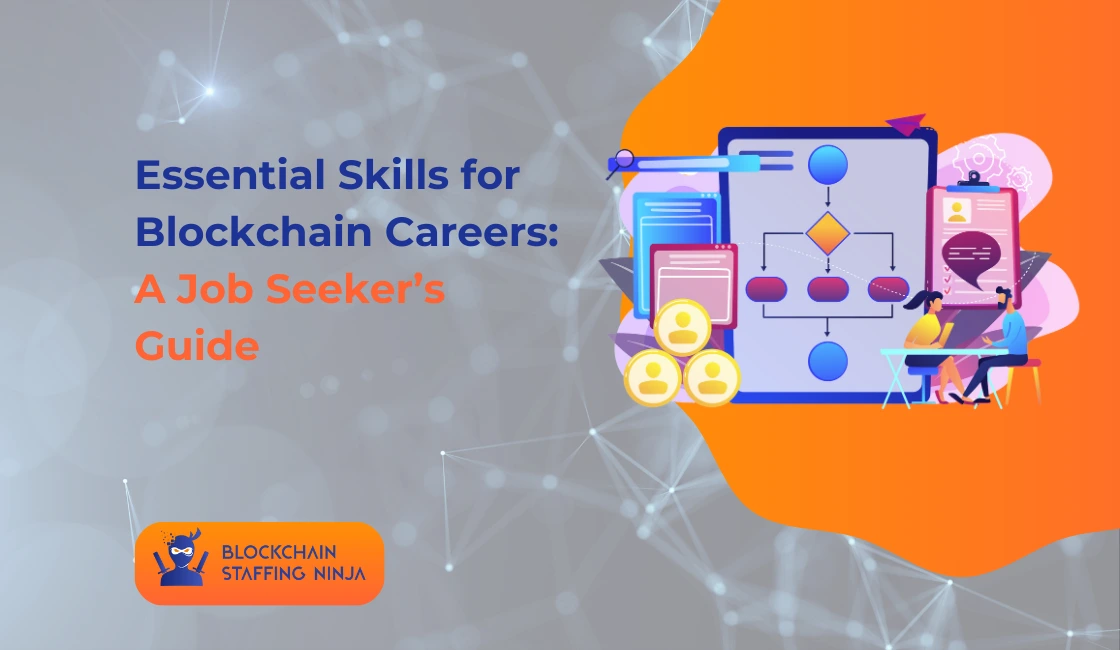The blockchain industry is booming, and global spending is slated to reach US $19 billion in 2024. Beyond cryptocurrencies, blockchain technology is a decentralized digital ledger for secure recording and verification of transactions across a network of computers. Companies are actively implementing blockchain jobs, leading to a significant increase in the demand for skilled professionals. Such is the demand that Blockchain industry-related companies are looking for job candidates with dedicated skills for blockchain careers who will have to acquire specialized skills related to smart contract development, cryptography, and distributed systems if they want to take advantage of this transformative opportunity.
What is Blockchain Technology?
Blockchain technology is a new digital system that works like a distributed digital ledger that is shared and maintained across many computers. Essentially, it is a chain of data blocks, each containing transaction records linked by cryptographic hashes, making the information virtually tamper-proof.
Three essential components define blockchain technology:
- Distributed Ledgers
Multiple computers, known as nodes, store data instead of a centralized location, making it secure and transparent.
- Smart Contracts
Programs that execute automatically when specific conditions are met, in accordance with predefined agreement terms.
- Consensus Mechanisms
There are protocols that help network participants reach a consensus on the legitimacy of transactions.
We recommend the following resources to those interested in learning more about blockchain:
- Coursera’s “Blockchain Specialization”
- MIT OpenCourseWare’s blockchain materials
- IBM’s Blockchain Essentials course
- Mastering Bitcoin by Andreas Antonopoulos
The aforementioned information is essential for anyone aspiring to work in blockchain, as it establishes the fundamental basis for more intricate and advanced applications and development.
Programming Skills
Programming knowledge is basic to blockchain development, and numerous important languages play major roles in the growth of the industry. Solidity is the primary language for building Ethereum smart contracts; languages such as C++, Python, and JavaScript are the programming languages for blockchain, DApps, or decentralized applications.
Therefore, to effectively communicate with the development team and understand the structure of a blockchain, even non-developers must grasp basic programming concepts. Beginners can use Python or JavaScript as a foundation before applying specialty languages like Solidity to enhance their blockchain-specific knowledge.
Good resources include CryptoZombies for Solidity, freeCodeCamp’s courses and challenges about JavaScript, Codecademy’s Python tutorials, and the blockchain development guides by GitHub. With good programming skills, developers can build safe, scalable, and efficient blockchain solutions, a skill that requires technical proficiency and is therefore one of the conditions for success in such a rapidly changing industry.
Problem-Solving Abilities
Problem-solving is an important part of the blockchain industry. Professionals here frequently encounter major blockchain challenges such as scalability limits, security vulnerabilities, and chain compatibility issues. Enterprise levels necessitate alternatives when considering optimization for better transaction speeds and network security in the far future.
For instance, when it comes to scalability, innovations such as Layer 2 protocols or sharding mechanisms may be required. Aspiring blockchain developers can acquire these crucial problem-solving skills by participating in hackathons, open-source projects, or completing blockchain-specific coding challenges.
Platforms like Gitcoin provide real-world problem-solving through bounties, whereas hackathons deliver hands-on experience in solving blockchain-specific challenges, usually in an intense period of time. Regular cryptographic puzzles and algorithm optimization activities will improve blockchain developers’ analytical skills.
Knowledge of Regulations and Compliance
Understanding compliance in the blockchain industry is crucial due to the dynamic nature of the legal frameworks that apply to cryptocurrencies, digital assets, and decentralized finance. This calls for knowledge of anti-money laundering (AML) regulations, know-your-customer (KYC) requirements, and data privacy laws such as GDPR that directly affect the implementation and adoption of blockchain.
The different approaches in jurisdictions require understanding local and international blockchain regulations and compliance requirements. To keep abreast, professionals can follow the announcements of the regulatory bodies, maintain subscriptions to legal news like Blockchain Law & Policy, and attend compliance-focused webinars.
Communication Skills
Effective communication skills are critical in the blockchain industry, as complex technical ideas need to be communicated to developers, investors, and customers from a variety of stakeholders. These skills are crucial not only for successful project execution but also for fostering teamwork and preventing misunderstandings.
Professionals have the responsibility to educate users of decentralized technologies and their associated risks and benefits, thereby establishing trust and paving the way for broader adoption. Strong communication is the most determinant factor in the success of any blockchain project and, therefore, the most vital asset. Joining a public speaking group like Toastmasters, practicing through presentations and workshops, and practicing active listening can help you improve your communication skills.
Conclusion
For the blockchain industry, the skill set should vary from hardcore, technical skills to soft skills. It starts with understanding core blockchain concepts and programming languages, goes to developing strong problem-solving abilities, governmental regulation knowledge, and communication skills, and then continuously evolves every minute, as does the nature of this dynamic field. Focusing on developing all of these five essential skills—and dedicating your life to continuous learning—will help you with your career in blockchain and better position yourself for success in the transformative world of blockchain technology. The future belongs to those who prepare for it today. Start your blockchain journey now.
